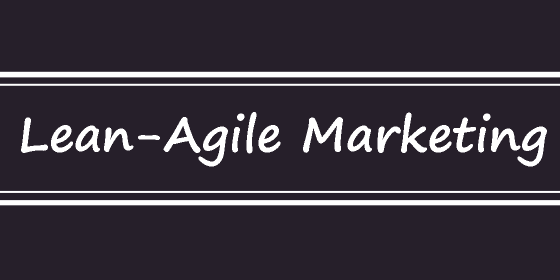Lean-Agile Marketing

Lean-Agile Marketing is an approach to marketing that combines principles from Lean and Agile methodologies. It focuses on optimizing marketing processes, improving efficiency, and delivering value to customers in a fast-paced and dynamic business environment.
Key aspects of Lean-Agile Marketing include:
- Customer-Centricity: Lean-Agile Marketing places a strong emphasis on understanding customer needs and preferences to guide marketing strategies and activities.
- Iterative Marketing Planning: Marketing plans are developed in short iterations, allowing for flexibility and adaptation based on customer feedback and market changes.
- Rapid Experimentation: Lean-Agile Marketing encourages rapid experimentation with different marketing tactics to identify the most effective approaches.
- Continuous Improvement: Marketing teams regularly review and improve their marketing efforts through feedback and data-driven insights.
- Lean Campaign Execution: Marketing campaigns are executed in a lean manner, minimizing waste and focusing on high-value activities.
- Data-Driven Decision-Making: Lean-Agile Marketing relies on data and analytics to inform marketing decisions and measure campaign success.
- Cross-Functional Collaboration: Lean-Agile Marketing promotes collaboration between marketing, sales, product development, and other departments to align efforts and achieve shared goals.
- Agile Marketing Retrospectives: Regular retrospectives are conducted to review marketing performance, identify areas for improvement, and implement changes.
- Agile Marketing Teams: Marketing teams adopt Agile practices, such as Scrum or Kanban, to organize work and improve team efficiency.
- Value-Oriented Marketing: Lean-Agile Marketing focuses on delivering value to customers through marketing efforts, rather than solely focusing on promotional messaging.
Lean-Agile Marketing aims to optimize marketing processes, eliminate inefficiencies, and adapt quickly to changing customer needs and market conditions. It supports a culture of continuous improvement, collaboration, and customer-centricity, enabling marketing teams to become more responsive and effective in achieving their objectives.
To implement Lean-Agile Marketing successfully, organizations need to foster a culture of experimentation, data-driven decision-making, and cross-functional collaboration. Marketing teams must embrace Agile principles and practices, such as short planning cycles, customer feedback loops, and iterative campaign execution. By continuously learning and adapting, Lean-Agile Marketing allows organizations to stay ahead in today’s competitive marketing landscape and deliver exceptional value to their customers.